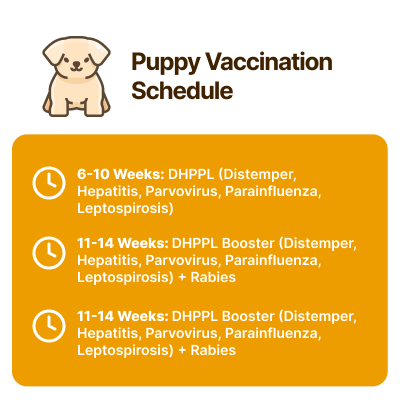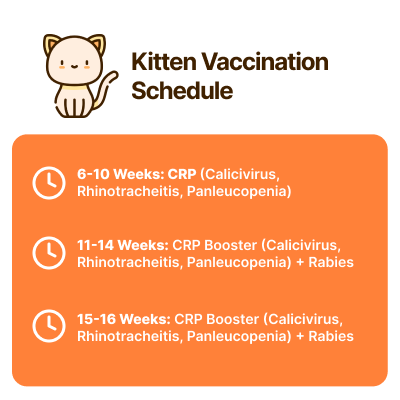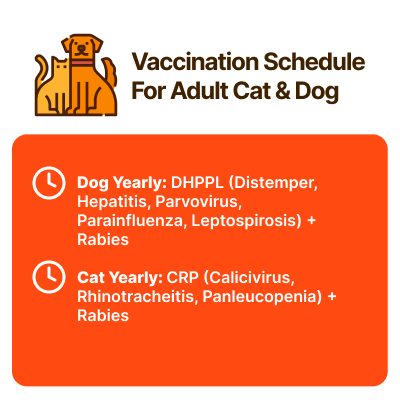


Frequently asked questions
Why pet vaccinations are Important?
Pet vaccinations play a critical role in protecting your dog, cat from many dangerous and even fatal diseases. While state law requires all dogs, cats to be vaccinated for rabies, many other vaccinations can protect your fur-kid from serious diseases that are easily preventable.
When do puppies start their vaccinations?
Distemper shots are usually given at 8, 10, and 12 weeks. Then at 15 weeks, three weeks later. Some vets give them at the ages of 8, 12, and 16, while others give them at the ages of 6, 12, and 16.
The fundamental criterion is that they should be administered 3-4 weeks apart (4 weeks maximum), with the last one occurring at or after 15-16 weeks.
The reason to vaccinate more frequently when dogs are young is that the mother-given immunity against distemper, parvo, adenovirus, hepatitis, parainfluenza and other diseases tends to fall off really precipitously around 10 weeks of age.
What if I misses a puppy vaccine in the series?
It should be given within a specified time frame, according to the manufacturer’s recommendation. So, if it’s been a while, your veterinarian will assess the dog’s age and week when each vaccine was given, and then determine the fresh series for your dog.
For example, if your puppy received its first vaccine at 8 weeks and there was no confirmation of a vaccine after 8 weeks and your puppy is now 15 weeks, the vet will administer one immediately and another in 3-4 weeks when your puppy is around 18 weeks. To ensure 100 per cent efficacy,
It is best for your dog to stick to the vaccine schedule.
Kitten and cat vaccinations: Do they really need to be given?
Well Yes! A kitten or cat owner is responsible for their feline friend’s happiness and longevity. Vaccinations for cats are an important part of their long-term health.
Vaccinations for kittens and cats have been medically and scientifically proven to protect against a variety of diseases.
What are the recommended cat vaccines?
Vaccinations for kittens and cats are determined by a variety of criteria, including pre-existing medical issues and whether they live indoors or outdoors.
You should always consult a veterinarian to decide your cat’s vaccine schedule based on these criteria. However, for an ordinary indoor house cat, we’ve put together a rough vaccination schedule.
- 6-10 Weeks: CRP (Calicivirus, Rhinotracheitis, Panleucopenia)
- 11-14 Weeks: CRP Booster (Calicivirus, Rhinotracheitis, Panleucopenia) + Rabies
- 15-16 Weeks: CRP Booster (Calicivirus, Rhinotracheitis, Panleucopenia) + Rabies
- Adult Cat: CRP (Calicivirus, Rhinotracheitis, Panleucopenia) + Rabies
What is the difference between a core vaccine and a non-core vaccine?
Core vaccines for cats and dogs are rabies and distemper, according to the Indian Veterinary Council. Of course, there is no distemper vaccine for cats. Although there is no such disease as feline distemper,
we refer to the feline viral rhinotracheitis calicivirus and panleukopenia vaccine as distemper in cats.



